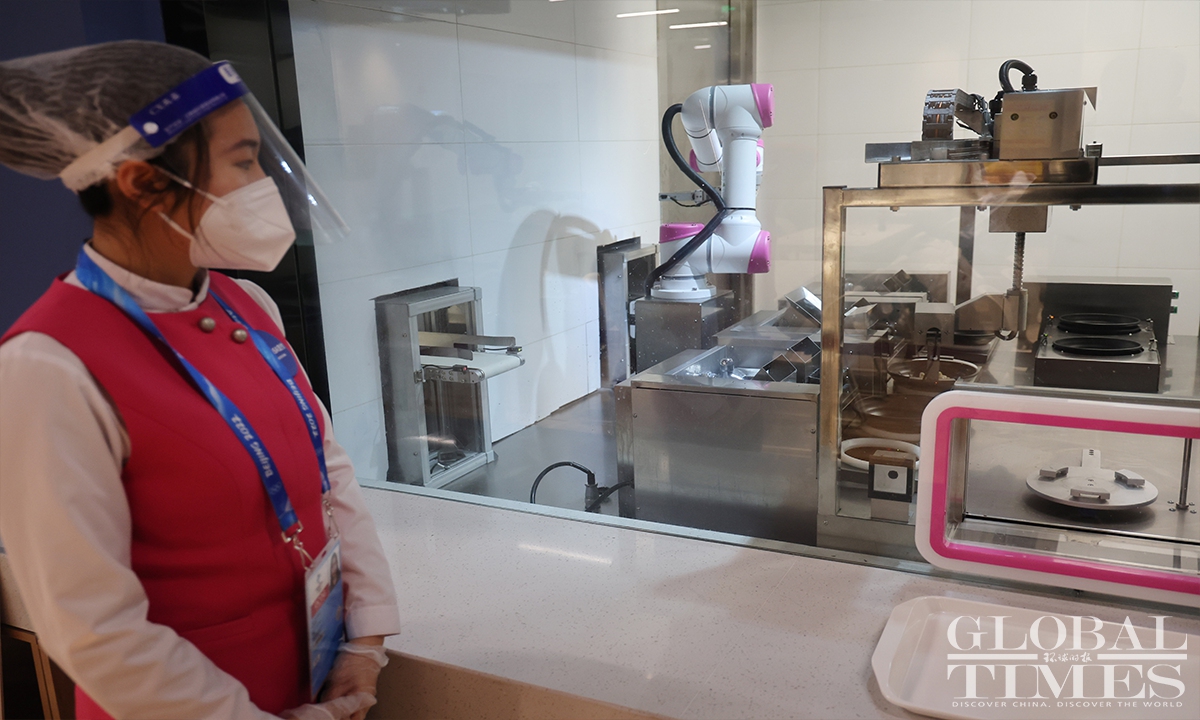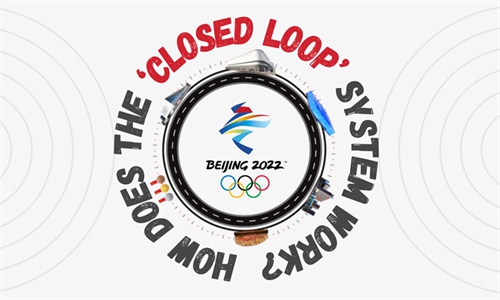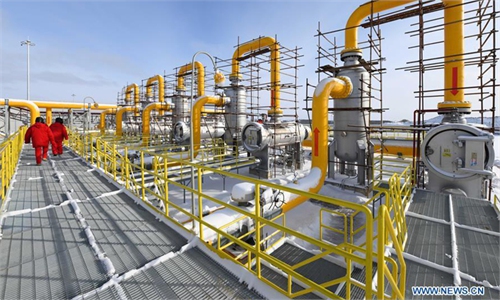Beijing’s trustworthy closed loop ensures success of Games, safety of participants, residents
Mechanism ensures success of Games, safety of participants, residents

Beijing 2022's closed loop management. Infographics: GT/Chen He
As the world praises Beijing for hosting an inspiring Winter Olympic Games in the shadow of a lingering pandemic, Beijing has never neglected the importance and necessity of epidemic prevention and control during the Games time.
Learning from the experience and lessons of the Tokyo Olympics, Beijing has applied a strict closed-loop management policy, which is unprecedented in a major comprehensive global sporting event. This is a policy that has ensured the safety of all Games participants as well as the residents of Beijing.
Beijing's target has never been zero cases but zero spread, Brian McCloskey, chair of the Beijing 2022 Olympics medical expert panel, said at an online media briefing on January 22. With the closed-loop system, Beijing is determined to shield its citizens and protect Olympic participants, he said.
Beijing's closed-loop system
The main system to guarantee Beijing 2022's smooth operations under the shadow of COVID-19 is the closed loop, which completely isolates Olympics-related personnel from the public outside the loop.
When Olympics-related personnel fly to China, they land at Terminal 3 of Beijing Capital International Airport and directly enter the closed loop without any contact with the outside world. They must hold two negative test results taken within 96 hours before boarding their flights. Upon arrival, they take another test which must also be negative, according to the Beijing 2022 playbook.
To avoid a mandatory 21-day quarantine, all inbound personnel must be fully vaccinated, unless granted a medical exemption. Those who are not vaccinated must first undergo quarantine before starting work in the closed loop.
Booster shots are not mandated but strongly encouraged. Nonetheless, venue operation personnel have confirmed to the Global Times, all Chinese support staff have received booster shots.
All Olympics-related personnel are only allowed to take designated transportation and travel within the closed loop, which includes 12 competition venues and 31 non-competition venues in three zones - in Beijing proper, Beijing's suburban Yanqing district and in adjacent Zhangjiakou, North China's Hebei Province.
Within the closed loop, all personnel must take a nucleic acid test every day. A positive result means compulsory isolation.
Not only are people managed in this way, but even items inside the closed loop are not allowed to pass outside in order to avoid the risk of virus transmission, a venue manager told the Global Times.
The closed loop is divided into a core loop and an outer loop. The core loop contains core event personnel such as athletes and coaches, and the outer loop contains other support staff. These two groups are required to avoid crossing with each other as much as possible.
Although the crowd inside the closed loop is restricted from having contacts with the outside, there will still be invited spectators entering the arenas to watch the events under strict anti-epidemic requirements.
According to documents the Global Times saw from an invited spectator, they must have received booster shots and have had no contacts with confirmed COVID-19 cases or asymptomatic infections 14 days prior to the Games, and must come from a community where no cases have been reported in 14 days. They must also have taken two nucleic acid tests within 96 hours prior to the Games.
Since sporadic COVID-19 cases are reported throughout China, having a designated audience would greatly reduce the probability of an outbreak among spectators as their traces can be tracked, a Beijing-based epidemiologist told the Global Times on condition of anonymity.
Zhao Jisheng, a professor at the College of Physical Education and Sports of Beijing Normal University, told the Global Times that the policy is "essential" under the current epidemic situation even though it will disappoint some winter sports fans.
Tokyo lessons
The Tokyo Summer Olympics held in August 2021 served as a model for Beijing's anti-epidemic policies in many ways, and also showed some lessons to learn, experts told the Global Times.
Tokyo's anti-epidemic system was "bubble-like," which was not fully carried out accordingly. Even before the Tokyo Games started, the bubble was believed to be "already broken," according to a top public health expert.
Although the Tokyo organizing committee required all Olympics-related personnel to travel in designated vehicles, a large number of people in fact took public transportation and nothing could, and would, be done to prevent this.
Beijing, instead, provides a complete system for all Olympics-related personnel to commute within the loop, including high-speed trains, shuttle buses, designated taxis and designated lanes.
Many foreign reporters hailed the Beijing mechanism as a "protective bubble" in the true sense. A Kyodo News reporter shared the experience of undergoing tests upon arrival, and taking designated transportation to venues, which are strict but effective in epidemic control.
In Tokyo, the entrances and exits of hotels were left unguarded, and people could move rather freely to nearby convenience stores and other places. Volunteers in Japan were also allowed to travel between sports venues and their homes.
The mingling of Olympics-related personnel and the general public was believed by experts to have been the cause for a rapid COVID-19 resurgence in Tokyo and the surrounding areas even after the Tokyo Games ended.
Another reporter from Japan who entered the closed loop on January 27, told the Global Times on condition of anonymity, that he was impressed by the strict anti-epidemic system. "I started preparations in Japan from downloading the 'My 2022' app, reporting my daily physical conditions, obtaining a vaccination certificate, taking the PCR test, obtaining a green code and applying for customs declaration."
"After entering the closed loop, I feel that it is a well-thought-out system," the Japanese reporter said.
In this regard, Beijing will require an additional period of quarantine for Chinese staff after the Olympic and Paralympic Games before they can mingle with the general public again.
Striking a balance
The epidemic prevention policy adopted by Beijing is not rigid either. Earlier, after receiving feedback from some delegations, the Beijing organizing committee and the related Chinese departments and agencies refined the Games' COVID-19 countermeasures, including adjusting the criteria for determining nucleic acid test results and shortening the length of time that close contacts must be put under restriction.
Under the new measures, only those with a PCR result that shows a Cycle Threshold (CT) of less than 35 will be considered COVID-19 positive, instead of the original 40.
The lower value indicates that it is more difficult for a person to get a positive test result, as CT values have an inverse relationship with viral loads.

Photo: Li Hao/GT
Trustworthy system
Although the emergence of the Omicron variant is forcing Beijing to face an even more difficult epidemic situation than Tokyo had to, the international community remains confident in Beijing's epidemic prevention system for the Winter Olympics.
IOC President Thomas Bach commended the joint efforts by Chinese authorities and the Chinese people which ensured excellent and smooth preparations for the Games, in Beijing during his meeting with Chinese President Xi Jinping on January 25.
In an interview with the Xinhua News Agency on Monday, the eve of the Chinese New Year, Bach said the holding of the Winter Olympics as scheduled, against the backdrop of the raging Omicron worldwide, demonstrated the resolve, efficiency and vitality of China. "We saw China's success in epidemic control."
Swiss snowboarder Jan Scherrer told Chinese media, "I think it's good to have a stricter anti-epidemic policy for the Winter Olympics. The whole world is in a special state right now and we need to accept that."
As of Saturday, 232 positive test results were found among the 12,000 Olympics-related personnel who arrived at Beijing Capital International Airport since January 23, when the Beijing organizing committee started to brief the situation daily.
Inside the closed loop, 82 positive cases were found via more than 740,000 tests during the same period.
McCloskey, the top medical expert for the Olympic Games, said at a press briefing on Wednesday the number of positive cases inside the closed loop was relatively low, showing the effectiveness of epidemic control.
At the moment there is no significant spread within the loop. We are not particularly worried as current cases are mostly separate, McCloskey said.


